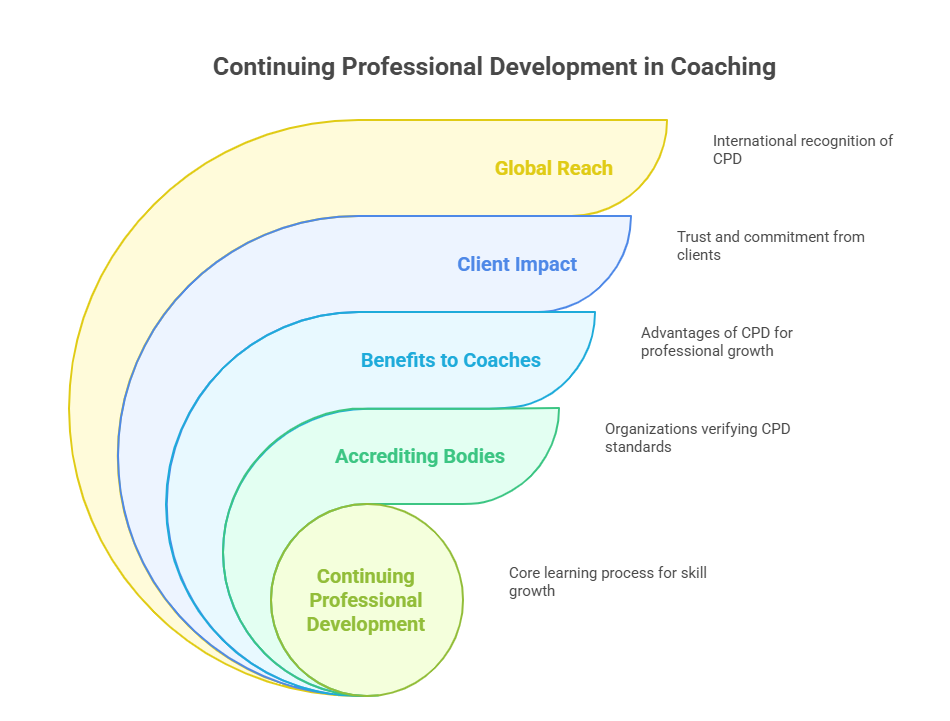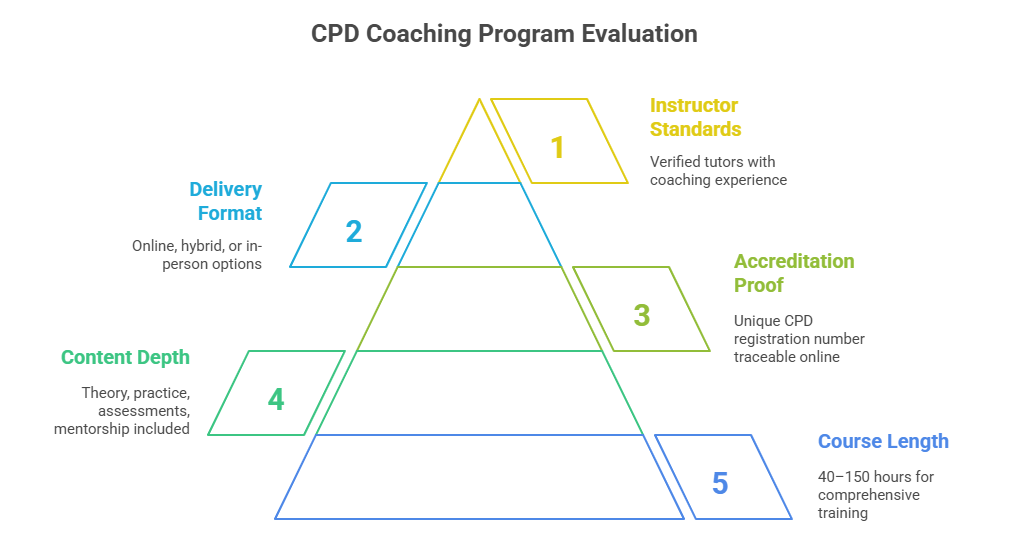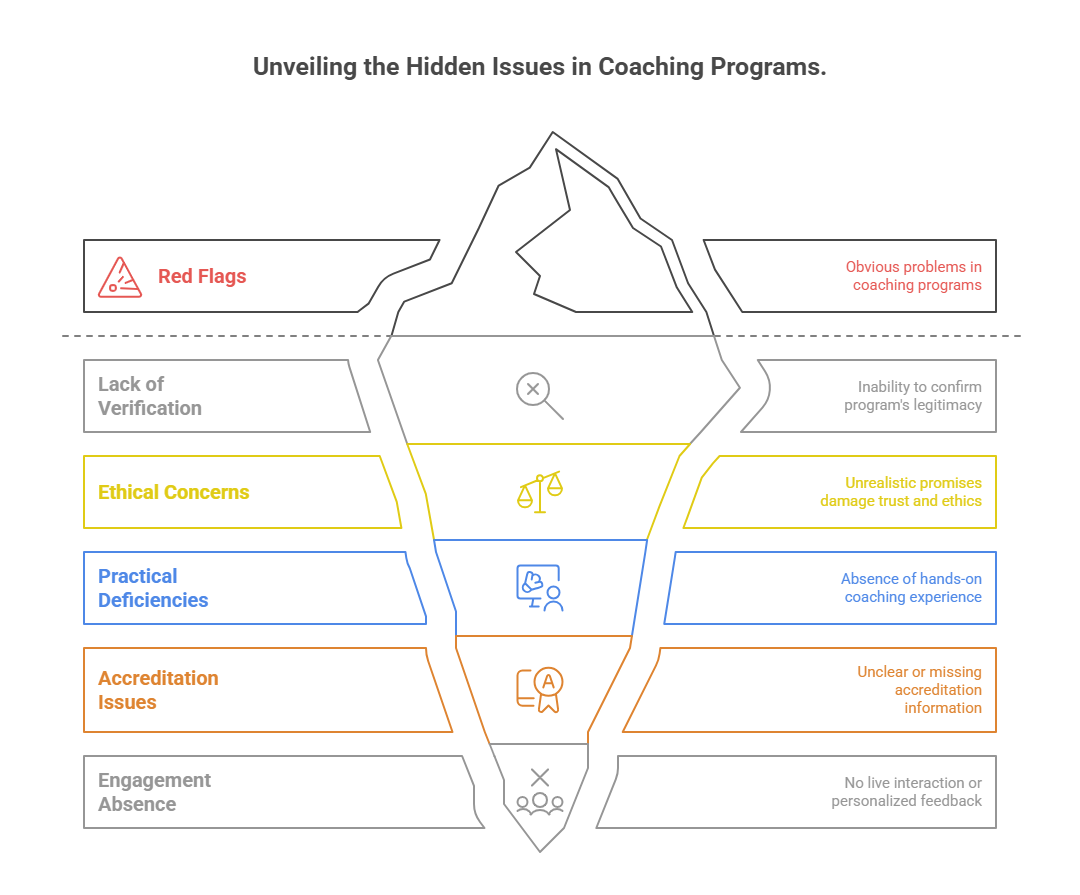Top CPD-Accredited Coaching Programs
In the competitive coaching industry, credentials matter — and CPD accreditation has quietly become one of the most powerful tools for coaches seeking professional legitimacy, deeper learning, and client trust. Continuing Professional Development (CPD) ensures that coaches don’t just learn once — they evolve continuously, sharpening their expertise to meet the changing emotional, mental, and practical needs of those they serve.
Whether you’re guiding clients through life transitions, health recovery, or executive leadership, holding a CPD-accredited certification communicates more than training hours. It signals adherence to globally recognized educational benchmarks, practical competency, and a commitment to ethical growth. For coaches building their private practice, entering new markets, or seeking to stand out in saturated niches, CPD isn't just a checkbox — it’s the signal clients, corporate buyers, and global organizations look for when choosing a professional they can trust.
What is CPD & Why It Matters in Coaching
Defining CPD (Continuing Professional Development)
Continuing Professional Development (CPD) refers to structured learning and skill-building activities that professionals undertake after initial certification or training. In the coaching field, CPD is not limited to theory refreshers — it includes hands-on workshops, supervised practice, ethical training, and advanced niche coursework. CPD ensures that coaches stay aligned with new methodologies, neurobiological insights, and evolving standards across life, health, and business coaching domains.
The CPD model emphasizes lifelong competency over one-time qualification. This allows coaches to meet new client needs, adjust to industry demands, and reduce skill atrophy. In regulated markets like the UK or UAE, CPD hours are often mandated yearly for licensure renewals or business registration. Even in unregulated regions, it’s an industry best practice — a marker of quality control, accountability, and relevance.
Unlike one-size-fits-all training models, CPD encourages coaches to customize learning based on growth goals. For example, a health coach may pursue motivational interviewing, while a life coach might dive into trauma-informed frameworks. CPD’s flexibility allows each professional to build depth and credibility where it matters most.
Global CPD Bodies & Recognition
Across continents, independent CPD accreditation bodies evaluate and approve coaching programs based on content rigor, learning outcomes, tutor qualifications, and practice hours. While each operates under different standards, the most recognized CPD authorities share a few core principles: outcome-based education, instructor expertise, and accountability.
Here are some widely accepted CPD organizations:
CPD Standards Office (UK): Recognized in the UK, EU, UAE, and Asia-Pacific. Evaluates coaching, therapy, corporate, and educational programs.
Continuing Medical Education (CME) bodies: Often cross-recognized with CPD in health-focused coaching certifications.
ACCRE & AAPC (US): Known for certifying programs in clinical research, medical billing, and coaching-related healthcare intersections.
These bodies provide unique CPD numbers and offer validation documents that coaches can present to employers, clients, or regulators. Accreditation by these entities increases global employability and reduces legal risks for coaches operating in clinical or organizational settings.
Some countries, like Ireland or Singapore, have adopted national CPD tracking frameworks, making recognition more seamless for cross-border practice. The presence of a CPD logo on a coaching certificate signals compliance with internationally benchmarked standards.
Why Clients Prefer CPD-Certified Coaches
Clients are more informed than ever — and many now research credentials before booking a single session. In this environment, CPD-accredited coaches instantly stand out. They signal more than experience; they communicate continuous growth, verified training, and a commitment to ethical excellence.
Three key reasons clients gravitate toward CPD-certified coaches:
Proof of updated methods: With new psychology tools and frameworks emerging annually, CPD ensures a coach isn’t using outdated techniques from a decade ago.
Assurance of credibility: CPD-backed credentials give clients confidence that the coach was trained under review, with clear educational outcomes.
Higher accountability: Accreditation bodies often investigate grievances. This gives clients recourse if something feels off — a safety net absent in informal certifications.
In niches like executive or trauma coaching, organizations may require CPD-backed certification for hiring or referrals. Even in personal coaching, CPD serves as a filtering mechanism for quality — helping clients distinguish between hobbyists and true professionals.
Evaluation Criteria for CPD Coaching Programs
Course Length & Content Depth
The best CPD-accredited coaching programs balance time commitment with educational depth. While some short workshops offer CPD hours, serious coaching certifications typically span 40–150 hours, divided across core competencies, supervised practice, and specialization tracks. The true benchmark isn’t length alone — it’s the depth of skill-building per module.
Effective programs include:
Foundational theory modules: Coaching models like GROW, SMART, or PERMA.
Client communication skills: Active listening, questioning frameworks, and boundary setting.
Practice hours: Role-play sessions or real-client practicums under mentor review.
Niche modules: Health behavior change, business strategy, or relationship dynamics, depending on the focus.
If a course claims CPD hours but lacks structured assessments or reflective assignments, that’s a red flag. CPD bodies assess content depth, ensuring each hour translates to measurable growth. Many programs also include peer evaluations and journaling, essential for developing professional self-awareness.
Accreditation Standards
Not all “accredited” programs are created equal. A proper CPD-accredited coaching certification must be recognized by an independent, third-party CPD provider — not just an in-house approval. These providers verify:
Tutor qualifications and instructional experience
Assessment rubrics and pass/fail logic
Feedback mechanisms and complaints handling
Practice hour tracking and outcome alignment
A course that meets these standards receives a unique CPD registration number, which learners can verify on the accreditor’s website. That number is critical for HR departments, clinic employers, or corporate wellness partners who require verification before approving a hire or reimbursement.
Programs should also be periodically re-reviewed. CPD is about continuous improvement, so courses must update every 1–2 years to reflect new coaching science, neuropsychology, or client diversity frameworks.
If a certification uses vague phrases like “CPD-level quality” without naming an accreditor, it’s likely unverified. Always check for CPD Standards Office, ACCRE, or a recognized global CME/CPD body seal before enrolling.
Delivery Format (Online, Hybrid, etc.)
Modern coaching professionals need flexibility without compromising quality. CPD accreditation can apply to in-person, online, and hybrid programs — but only when specific delivery standards are met. That includes:
Secure learning portals with progress tracking
Interactive elements like live Zoom or roleplay sessions
Downloadable CPD logs or progress certificates
Fully self-paced programs are only CPD-eligible if they include quizzes, assessments, and evidence of engagement. This prevents low-effort certificate mills from passing as real CPD.
Hybrid programs — especially those that mix live supervision with asynchronous coursework — often provide the richest learning experience. They blend flexibility with accountability, giving learners freedom without sacrificing rigor.
Also note: Some CPD accrediting bodies require minimum tutor-to-student ratios for mentorship-based learning to qualify. This is particularly relevant for certifications that include coaching practicums, where individual feedback is crucial.
If you’re coaching internationally, ensure the program’s format meets both CPD and local professional licensing criteria. Some countries require face-to-face hours or supervised coaching to legally operate as a wellness or life coach.
Top International CPD Coaching Courses Compared
UK, US, and EU Programs
Across the UK, US, and EU, top-tier CPD-accredited coaching programs differ in delivery, pricing, and target audience — but share core traits: comprehensive content, structured practice, and third-party validation. In the UK, organizations like The Coaching Academy and Animas Centre for Coaching lead the market with CPD-approved certifications that emphasize neuro-linguistic programming, therapeutic tools, and reflective practice.
In the US, CPD-certified coaching is often embedded within life and health coaching schools, including programs like those from the National Board for Health & Wellness Coaching (NBHWC), which align with CPD standards even if CPD isn't the primary accreditor. Meanwhile, Europe leans on academic rigor — programs in Germany or the Netherlands often partner with universities or healthcare councils to integrate CPD within coaching psychology tracks.
What matters most is not geography, but accreditor presence. A CPD number from a globally accepted body like the CPD Standards Office or ACCRE makes a course internationally portable. Coaches working across countries or in remote-first businesses need this cross-border legitimacy to grow client trust.
Pricing, Duration, Outcomes
Pricing varies dramatically, but value is tied to structure, not just hours. Low-cost “CPD coaching certificates” under $200 often lack instructor feedback or peer interaction — they’re usually self-paced PDFs repackaged into courses. By contrast, reputable programs fall in the $1,200–$4,000 USD range, depending on:
Whether supervision is included
Live class access
One-on-one mentorship
Practice session reviews and business coaching add-ons
Duration typically ranges from 6 weeks to 12 months, depending on intensity. Some fast-track formats offer 60–100 CPD hours over 8–10 weeks, with evening or weekend schedules. Slower, cohort-based programs may stretch to a year, especially if they require supervised practicum.
Key outcomes from high-quality CPD coaching programs include:
A valid CPD-accredited certificate with unique registration ID
A clear coaching framework (GROW, SMART, etc.)
Client intake templates and compliance training
Niche-specific tools for business, health, or life coaching
If outcomes aren’t outlined clearly in the program brochure or syllabus, that’s a sign the course may lack educational accountability.
Niche Specializations (Life, Health, Executive)
CPD accreditation becomes even more valuable when paired with specialization in high-demand coaching fields. Here’s a breakdown of what top programs offer by niche:
Life Coaching: Programs often focus on mindset shifts, cognitive reframing, habit design, and client vision planning. Tools like values elicitation and future self exercises are common.
Health Coaching: These programs integrate motivational interviewing, chronic disease support frameworks, and nutrition/fitness basics — often with CME crossover.
Executive Coaching: Tailored for corporate environments, executive tracks teach business communication, strategic advising, and leadership psychology. Many include modules on emotional intelligence and performance tracking.
Specialization allows coaches to charge more, attract targeted clients, and speak the language of their niche. CPD ensures this content meets professional development standards, not just surface-level trend chasing.
Many programs now offer stackable CPD pathways, where life coaches can add-on health certifications, or business coaches can integrate trauma-informed practice. This stackability is a huge plus for long-term growth and credibility.
| Region | Top Features | Example Institutions | Specialization Focus | Typical Pricing |
|---|---|---|---|---|
| United Kingdom | CPD Standards Office-backed, strong NLP and life coaching curricula, integrated mentorship | The Coaching Academy, Animas Centre for Coaching | Life coaching, NLP, transformational coaching | £1,000 – £3,000 |
| United States | CPD/CME hybrids, strong health and executive coaching tools, business integration | NBHWC-aligned programs, Wellcoaches, Primal Health Coach Institute | Health coaching, corporate wellness, habit change | $1,500 – $4,000 |
| European Union | University-linked CPD training, high academic rigor, cross-border CPD recognition | European Coaching Association, academic-affiliated programs | Executive coaching, leadership, organizational psychology | €1,200 – €3,500 |
| Middle East & Asia-Pacific | International CPD acceptance, blended formats, rising corporate demand | CPD-recognized institutions in UAE, Singapore, India | Life & career coaching, business transition support | $1,000 – $2,500 |
Red Flags in Low-Quality Coaching Programs
No Verifiable CPD Number
One of the clearest warning signs of a low-quality coaching program is the absence of a verifiable CPD number. A genuine CPD-accredited certification always includes a unique ID that can be checked against the accreditor’s official registry. If a program simply states “CPD-aligned” or “CPD equivalent” without listing an accreditation body or reference number, it’s not accredited — it’s marketing.
You can verify legitimate CPD certification by:
Asking for the exact name of the CPD body and registration number
Searching the provider in the accreditor’s online directory
Confirming how many hours were approved and when the course was last reviewed
Programs that avoid giving specifics often rely on false associations or vague claims to appear credible. This can hurt your reputation as a coach — especially in regulated industries or when seeking corporate contracts. It’s not enough to have a certificate with a logo. If the number isn’t registered and searchable, your “accreditation” won’t hold weight with clients, HR departments, or legal bodies.
Overpromising Outcomes
If a program guarantees six-figure income, instant clients, or “certification in just one weekend,” be cautious. Quality coaching programs — especially CPD-accredited ones — focus on skill development, ethical practice, and long-term growth, not clickbait-level promises.
Red flags to watch for:
No mention of practice hours or client supervision
“Unlimited earning potential” headlines without outlining the work involved
No curriculum transparency — just testimonials and sales language
CPD bodies require outcome-based curriculum design. That means learning objectives must be clear, measurable, and honest. Any course claiming mastery without guided practice, live assessment, or feedback lacks the depth CPD demands.
Moreover, good coaching is not about speed or shortcuts. It’s a craft built through reflective learning, structured conversation models, and emotional intelligence. If the focus is only on flashy success stories or social proof, with no substance underneath, that’s a poor foundation for any coaching career.
Lack of Real Practice Integration
A major flaw in subpar programs is the lack of hands-on client interaction, mentorship, or real feedback. CPD standards require structured application — not just passive learning. Courses that only offer videos, slides, or reading material without:
Practice coaching sessions
Peer-to-peer review or roleplay
Instructor evaluation or journaling prompts
...are not CPD-worthy — even if they label themselves that way.
Without live or recorded practice, you won’t develop:
Conversation pacing
Question-framing strategies
Ethics around boundaries, disclosure, and power dynamics
Programs must simulate or include actual coaching engagements. This builds confidence and prevents the common trap of being “certified but not ready.” Some low-tier courses skip this entirely, handing out certificates based solely on watching content or passing a multiple-choice quiz — which CPD regulators view as educational malpractice.
Ultimately, any course that ignores practice — or treats it as optional — fails to prepare you for the real demands of coaching. And that leaves you at risk of poor results, refund requests, or worse: client harm.
How to Choose Based on Your Coaching Niche
Life vs Health vs Business Coaching
Not all coaching certifications are interchangeable — and selecting a CPD-accredited program that matches your niche is critical for long-term success. The tools, frameworks, and client expectations in life coaching differ substantially from those in health or business coaching.
Life Coaching: Look for programs that focus on goal-setting techniques, mindset reprogramming, and emotional resilience tools. CPD-accredited life coaching tracks often include vision planning, cognitive reframing, and strategies rooted in behavioral psychology.
Health Coaching: Requires evidence-based modules in lifestyle change, chronic illness support, motivational interviewing, and client compliance. Top CPD-approved programs in this space often intersect with CME standards and may include supervised case studies for high-risk clients.
Business Coaching: CPD-certified business coaching programs prioritize organizational behavior, leadership development, and performance optimization frameworks. Coaches working with executives, founders, or corporate teams need certification paths that include strategic planning, KPI mapping, and conflict navigation tools.
Choosing the wrong fit — like enrolling in a generic life coaching course when you're targeting corporate leaders — can weaken your authority and delay ROI. A niche-aligned CPD path ensures that the skills you develop are directly transferable to your desired coaching market.
Audience Type (Corporate vs Individual)
Your target audience — corporate or individual — should guide your certification decision just as much as your niche. CPD-accredited programs designed for corporate coaching typically focus on deliverables that companies expect:
ROI-based coaching metrics
Team coaching dynamics
Business communication protocols
Ethics within workplace systems
These programs often prepare you to work within HR frameworks, wellness initiatives, or performance departments. Accreditation also helps bypass procurement red tape, as many companies require CPD approval before hiring outside coaching vendors.
By contrast, if you're targeting individuals — whether for personal growth, relationship clarity, or health transformation — you'll want programs that emphasize intake skills, behavioral change models, and emotional intelligence. These certifications must go deeper into one-on-one dynamics and often include frameworks like the PERMA model or Internal Family Systems (IFS) elements.
Ask yourself:
Does my client expect reports or results tracking?
Will I need to liaise with companies or medical teams?
Am I coaching for transformation, productivity, or recovery?
Aligning your CPD certification with your audience’s expectations ensures you can deliver meaningful results — and position yourself as a professional whose training fits the client’s context, not just your passion.
| Factor | Consideration | Best Fit Program Traits |
|---|---|---|
| Coaching Type | Choose based on whether you serve life, health, or business-oriented clients |
Life: Emotional growth, values work Health: MI, chronic condition support Business: Leadership, KPIs, conflict tools |
| Audience Type | Determine if you're working with individuals or organizations |
Corporate: Needs ROI, structured outcomes Individual: Needs empathy, flexible tools |
| Tools & Frameworks | Different coaching paths require niche-relevant tools |
Health: Compliance, MI, CBT Life: Vision planning, reframing Executive: EI, performance metrics |
| Learning Format | Consider your schedule, access, and practice needs |
Hybrid: Best for hands-on practice + flexibility Live Online: Real-time mentoring, peer feedback Self-paced: Ideal for experienced learners |
| Compliance Needs | Some regions require specific accreditation or supervised hours |
Medical crossover: Needs CME/CPD Corporate: May need CPD verification Global: Ensure portability |
Why ANHCO’s ADHLC Certification Meets CPD Standards
The Advanced Dual Health and Life Coach Certification (ADHLC) by ANHCO is a standout in the crowded coaching education space — not just for its depth, but for its verified alignment with international CPD standards. Designed for aspiring and mid-career coaches, this program integrates two high-demand niches — health and life coaching — while meeting the rigorous benchmarks required by global CPD bodies.
First, the ADHLC certification includes over 500 self-paced lessons, with structured practice sessions, live mentorship, and client simulation modules. CPD accrediting bodies prioritize applied learning, and ANHCO ensures this through supervised feedback, assessment checkpoints, and evidence-based coaching frameworks. From PERMA to MI to goal-framing, each module is tied to real-world application — not theory in isolation.
Second, the certification is backed by international third-party CPD verification, complete with a traceable registration number. This provides legitimacy when applying for corporate roles, wellness clinics, or global coaching platforms. It also makes the certification portable — useful for coaches working in telehealth or across borders.
Finally, ANHCO’s course content is reviewed and updated to reflect clinical best practices, behavioral science, and coaching ethics, all of which are core to CPD compliance. Coaches graduate with tools, credibility, and a proven path to sustainable practice — all under the umbrella of CPD assurance.
Frequently Asked Questions
-
A CPD-accredited coaching certification is approved by a Continuing Professional Development body that verifies the program’s educational quality, outcomes, and relevance to professional standards. Unlike unaccredited or self-styled programs, CPD courses are reviewed for instructional design, tutor qualifications, assessment quality, and real-world application. They are held accountable to periodic updates and ethical standards, ensuring that the content remains current with evolving coaching science and client needs. This type of certification is more likely to be recognized by corporate clients, insurance providers, or health organizations looking to hire or refer coaches. In contrast, non-accredited programs may lack oversight, structure, or formal recognition — putting your credibility at risk in competitive or regulated markets.
-
Always ask for the course’s unique CPD registration number and the name of the accrediting body — such as the CPD Standards Office, ACCRE, or a recognized Continuing Medical Education (CME) provider. Once you have that information, visit the accreditor’s official website and look for a public registry or verification page. Legitimate programs will appear there, along with information on approved hours and valid dates. Be wary of vague phrases like “CPD-aligned” or “meets CPD criteria” without traceable verification. A true CPD-accredited course will also include downloadable documentation and certification details that you can present to clients, employers, or licensing boards.
-
Yes — CPD accreditation plays a major role in building trust and authority with clients, especially in saturated markets. Potential clients often check credentials before booking a session, and seeing CPD-backed training signals professionalism and accountability. For corporate, wellness, or healthcare clients, CPD certification can even be a hiring requirement or part of reimbursement documentation. In fields like health and executive coaching, organizations prioritize credentialed coaches with verifiable education over those with generic or online-only certifications. The CPD seal provides reassurance that you follow ethical guidelines, maintain updated knowledge, and have been trained under quality-controlled standards.
-
While all coaches can benefit from CPD, it is especially valuable for professionals in health, life, executive, trauma-informed, and business coaching. These niches involve high-stakes conversations and sensitive goals — requiring a foundation of ethical, evidence-based practice. CPD-certified coaches are more likely to be accepted by insurance-backed programs, workplace wellness initiatives, and international coaching platforms. Coaches transitioning from clinical, HR, or corporate backgrounds also benefit because CPD certification mirrors formal training environments they’re already familiar with. Ultimately, if you want your credentials to be globally recognized and respected, CPD should be a priority in your certification path.
-
Yes — many high-quality CPD-accredited coaching programs are delivered online or in hybrid formats. However, to be eligible for CPD approval, these online programs must meet specific requirements: secure portals, trackable progress, interactive learning components, and evidence of active engagement such as quizzes, assignments, or mentor-reviewed sessions. Fully passive, video-only courses without assessment or instructor interaction typically do not qualify for CPD accreditation. Programs like ANHCO’s ADHLC are examples of well-structured online models that combine asynchronous content with live mentorship and practice integration — fulfilling CPD’s core requirements while remaining flexible for global learners.
-
Yes — CPD accreditation is recognized across the UK, EU, Middle East, Asia-Pacific, and parts of North America, especially when issued by well-known bodies like the CPD Standards Office or ACCRE. While the U.S. does not have a centralized CPD system, many American employers, hospitals, and corporate wellness programs still honor international CPD accreditation — particularly if it's paired with continuing education hours or CME equivalents. For digital or remote-first coaching businesses, CPD becomes even more valuable because it allows you to practice across borders and align with global industry expectations. This makes it an excellent choice for coaches aiming to scale beyond their local market.
-
Most CPD-accredited certifications remain valid indefinitely, but best practice is to complete CPD hours annually to maintain your edge and meet evolving standards. Some accrediting bodies recommend 20–40 CPD hours per year, depending on your specialization. For coaches in medical-adjacent niches like health coaching, regulatory bodies or employers may require documented CPD participation to ensure continued clinical relevance. Even if renewal isn’t mandatory, regularly updating your training through CPD-approved workshops or micro-courses helps you stay ahead of trends, maintain ethical compliance, and offer the most effective strategies to your clients — especially as coaching tools and client expectations continue to evolve.
Conclusion
In a saturated coaching industry where titles are easy to claim but hard to trust, CPD-accredited certifications serve as a gold standard — separating credible professionals from quick-fix marketers. Whether you're aiming to coach in health, life, or executive spaces, CPD approval proves your commitment to continuous improvement, ethical practice, and outcome-based learning.
From verifiable certification numbers to hands-on client integration, CPD-backed programs give you more than a credential — they give you market trust. And when that certification is as robust and niche-aligned as ANHCO’s Advanced Dual Health and Life Coach Certification (ADHLC), you gain the tools, structure, and recognition to lead confidently in any coaching space.
The right program doesn't just certify you. It prepares you for sustainable growth — with clients who trust your methods, employers who respect your credentials, and a global community that values lifelong learning. Choose wisely, and let your training speak for itself.
| Which aspect matters most to you when choosing a CPD-accredited coaching program? | |
|---|---|




